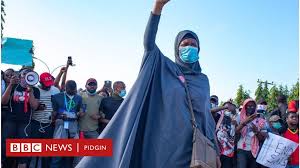

Anger continues to grow despite the notorious Special Anti-Robbery Squad being disbanded in Nigeria.
More than 10,000 demonstrators flocked onto the streets of Nigeria’s capital city to join mounting protests against police brutality. Protesters clogged roads, bringing the centre of Lagos, the usually traffic-filled economic hub, to a standstill.
Many brandished the green-and-white Nigerian flag as they filled a major stretch of highway in the city of 20 million people.
Anger over abuses by the police’s notorious Special Anti-Robbery Squad (Sars) erupted into widespread demonstrations last week, forcing the government to scrap the unit.
The crowds have continued to grow despite the announcement of a string of reforms from the rattled authorities. At least 10 people have died and dozens injured in the demonstrations, which have been met with force by police units.
The wave of protests is the biggest display of the people’s power in years in Africa’s most populous nation as young people demand more sweeping changes.
Nigeria’s authorities have set up a new special weapons and tactics (Swat) unit to replace Sars and pledged to hold officers who have committed abuses accountable. But many are sceptical that the government will follow through with genuine change, after a rights group said that up to 10 people were killed in the initial harsh response to the protests.
more recommended stories
 In New Geopolitical Play, Trump Eyes Somaliland to Block China and Defeat Houthi
In New Geopolitical Play, Trump Eyes Somaliland to Block China and Defeat HouthiHARGEISA – April 12, 2025 —.
 A Celebration, a Surprise, and a Strategic Masterstroke: How Somaliland’s Irro Quietly Redirected Lasanod’s Political Hopes
A Celebration, a Surprise, and a Strategic Masterstroke: How Somaliland’s Irro Quietly Redirected Lasanod’s Political HopesBy Mohammed Yasin Omar LASANOD, SOMALILAND.
 Somaliland Parliament: Any Consequences from PM’s Visit Are Somalia’s Responsibility
Somaliland Parliament: Any Consequences from PM’s Visit Are Somalia’s ResponsibilityHARGEISA, April 12, 2025 — The.
 From Berbera to Washington: Somaliland’s Strategic Pitch for U.S. Support
From Berbera to Washington: Somaliland’s Strategic Pitch for U.S. SupportIn a comprehensive interview with The.

